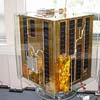 |
Moscow (Interfax) Nov 19, 2001 Russia has available orbital frequency resources that could be filled with light communications satellites, the general director of state company Space Communications (GPKS) said. Russia currently has 30 unoccupied orbital positions that have been agreed or partially agreed with the International Telecommunication Union (ITU) for 2003 to 2006, Boris Antonyuk said at a news conference at Interfax. Positions with small frequency resources are ideal for the launch of small communications satellites, he said. Antonyuk said that an agreement that GPKS has signed with the Khrunichev space center calls for the construction and launch of one small satellite based on the Dialog series, weighing 500 kg and equipped with ten to 12 transponders. Canadian company EMS, which won a tender held by Khrunichev, will manufacture the payload for the satellite. GPKS, the operator of the national communications satellite system, sees a need for using the potential of small satellites, Antonyuk said. The company does not plan to reject the option of working with other satellite manufacturers besides Khrunichev, he added. The main burden of financing production of the satellite, according to the agreement, will lie with the producer, Khrunichev, Antonyuk said. GPKS assesses the economic viability of launching such satellites based on estimates of the cost of one transponder in orbit. The price offered by Khrunichev satisfies me as a client, he said. The money received from the operation of this satellite will be enough to pay suppliers and contractors, as well as to earn a little profit. Russia's State Duma in the fall approved a program to build seven communications satellites to bolster the state orbital cluster, Antonyuk remarked. The government is expected to subsidize 25% to 30% of the cost of producing and launching these satellites, which will total $780 million to $800 million, he said. About 30% of the resources of the GPKS satellite system are currently dedicated to handling tasks in the interest of the state, Antonyuk said. The revenues from these resources amount to less than a third of commercial prices, he said. All rights reserved. � 2001 Interfax. Sections of the information displayed on this page (dispatches, photographs, logos) are protected by intellectual property rights owned by Interfax. As a consequence, you may not copy, reproduce, modify, transmit, publish, display or in any way commercially exploit any of the content of this section without the prior written consent of Interfax. Community Email This Article Comment On This Article Related Links SpaceDaily Search SpaceDaily Subscribe To SpaceDaily Express Microsat News and Nanosat News at SpaceMart.com
 Clyde, Scotland (SPX) Jan 12, 2006
Clyde, Scotland (SPX) Jan 12, 2006Clyde Space are offering the growing ranks of small satellite manufacturers power subsystem solutions for their missions. Based in purpose built facilities on West of Scotland Science Park in Glasgow, Clyde Space has a range of power subsystems for missions from as little as 1W up to in excess of 2.5kW. |
|
|
|
|
|
|
|
|
|
|
|
|
|
| The content herein, unless otherwise known to be public domain, are Copyright 1995-2006 - SpaceDaily.AFP and UPI Wire Stories are copyright Agence France-Presse and United Press International. ESA PortalReports are copyright European Space Agency. All NASA sourced material is public domain. Additionalcopyrights may apply in whole or part to other bona fide parties. Advertising does not imply endorsement,agreement or approval of any opinions, statements or information provided by SpaceDaily on any Web page published or hosted by SpaceDaily. Privacy Statement |